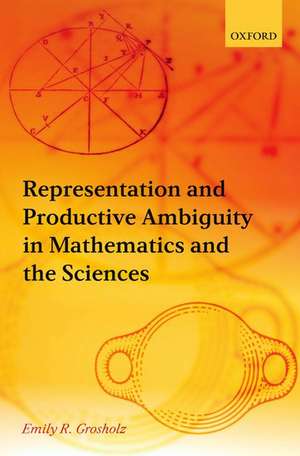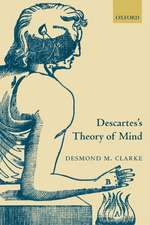Representation and Productive Ambiguity in Mathematics and the Sciences
Autor Emily R. Grosholzen Limba Engleză Hardback – 30 aug 2007
Preț: 776.12 lei
Preț vechi: 1114.28 lei
-30% Nou
Puncte Express: 1164
Preț estimativ în valută:
148.53€ • 153.89$ • 123.96£
148.53€ • 153.89$ • 123.96£
Carte tipărită la comandă
Livrare economică 10-17 martie
Preluare comenzi: 021 569.72.76
Specificații
ISBN-13: 9780199299737
ISBN-10: 0199299730
Pagini: 332
Ilustrații: 50 illustrations
Dimensiuni: 162 x 240 x 24 mm
Greutate: 0.65 kg
Editura: OUP OXFORD
Colecția OUP Oxford
Locul publicării:Oxford, United Kingdom
ISBN-10: 0199299730
Pagini: 332
Ilustrații: 50 illustrations
Dimensiuni: 162 x 240 x 24 mm
Greutate: 0.65 kg
Editura: OUP OXFORD
Colecția OUP Oxford
Locul publicării:Oxford, United Kingdom
Recenzii
The wide range of topics and detail in which they are discussed offer some significant insights into the philosophy of science and mathematics. Moreover, Grosholz makes a generally persuasive case that scientific progress is often the result of a synthesis from several traditions that combines very different ways of representing the same subject matter... She has given us a very readable and well-argued series of case studies in the history and philosophy of the sciences. Anyone with an interest in the history of mathematics, the history of science, or the general philosophy of science is bound to find a wealth of interesting material here.
Grosholz has done a good job of laying out some of the more fascinating contents of the scientists' and mathematicians' tool boxes
Anyone interested in mathematical practice will find plenty of material in this book ... philosophers who wish to reject Grosholz's views had better come up with collections of studies at least as detailed and compelling as these. That is no small challenge.
Grosholz has done a good job of laying out some of the more fascinating contents of the scientists' and mathematicians' tool boxes
Anyone interested in mathematical practice will find plenty of material in this book ... philosophers who wish to reject Grosholz's views had better come up with collections of studies at least as detailed and compelling as these. That is no small challenge.
















